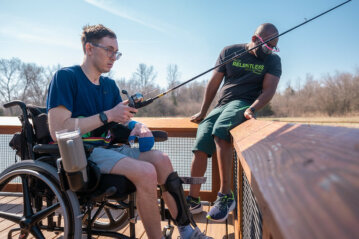After a friend or loved one suffers a traumatic brain injury (TBI), there are numerous things to navigate. What will their care needs look like? How will their job status change? But running as an undercurrent through all of these is the question of identity—just exactly who will the person be following injury?
One of the most significant challenges following a TBI is cognitive status. Every waking moment centers on using aspects of cognition to understand and react to our environment—both the intake of information and the decisions and actions we make based on our perceptions. Our everyday behavior is governed by logic, situational awareness, experience, and intuition. This includes both minor daily decisions—what to eat or how to dress—to major life decisions—should I purchase a house, get married, or accept a new job. Cognition also encompasses language reception, production, and social interaction. Do we understand what someone is saying to us? How do we carry ourselves in conversations? What should we say or not say to someone?
With a TBI, cognition of all kinds might be impaired. Of course, no two TBIs are alike in how they affect an individual. One of the cognitive issues a person may struggle with is the ability to make any decisions
A lack of clear decision-making capability and vulnerability because of a TBI may take the form of an individual providing personal information in response to a phishing email scam or clicking on virus-ridden pop-up ads. If we do not have a TBI, we understand through logic and situational awareness that phishing scams and pop-up ads are best ignored and blocked, whereas the same tenets may not be obvious to someone with a TBI (again, the degree varies).
Impulse control is another one of the cognitive issues that may arise following injury. Impulsivity can be exhibited in a multitude of ways. A lack of impulse control may lead to frequent interrupting of others during conversations, making rude remarks, exhibiting risky behaviors, or having emotional outbursts.
Previously fluent communication may also become disrupted. This takes on many forms, such as aphasia or apraxia, and can show itself through a general inability to find a word, vocalizing the wrong 
But why do cognitive deficits occur so frequently with TBIs? The explanation directly relates to the frontal lobes—the largest section of the brain that deals with executive functioning, decision-making, and cognition.
Improving cognitive deficits is a primary goal of rehabilitation services. For more information on QLI’s brain injury rehabilitation program, click here.
Categories: Brain Function, Brain Health, Brain Injury
